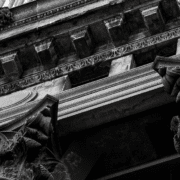They’re Coming to Take Away Your Cash
The stories are all over the Internet. Governments are forcing us into a cashless society. Supposedly the pretext is terrorism, and the real reason is to take more control. No doubt more power appeals to politicians, and banning cash seems like the next step after mandatory reporting of cash transactions. However, I think there is a more serious driver than simple power lust.
A more compelling case is that cash banning is the logical follow up to bail-ins. Most people think a bail-in is when banks steal your deposit. So it seems to make sense that governments want to force people to keep their cash in the bank. Then they are easy meat for the next bail-in.
However, a bail-in isn’t theft by your bank. There’s theft, alright, but the culprit is upstream. For example, in the case of Cyprus, the theft occurred in plain sight. The thief was Greece. That country sold instruments which it fraudulently called bonds, but it had neither means, nor the intent to repay. Those bonds are bogus paper. The Greek government stole the money, in the guise of borrowing it.
The Cypriot banks invested considerable deposits in Greek bonds. When depositors realized this, they began to withdraw their cash—a run on the banks. The banks were insolvent, so someone had to take losses. A bail-in shifts the losses from bondholders and other creditors to depositors.
It’s an example of how a corrupt monetary system causes corruption in banking. If government bonds are defined as the risk-free asset, then banks must hand depositors’ funds over to governments to spend. That can’t end well.
An honest bank will shut down operations before it burns through so much capital as to harm depositors. However, regulation obliges banks to buy government bonds (typically using short-term deposits). Thus the bail-in was devised to protect banks, though it violates law developed over centuries.
Neither control for its own sake, nor bail-ins, are the primary drivers of going cashless. Central banks don’t care about regulating the people, though they do support this new war on cash. Bail-ins are not a consideration in the US yet, though already American economists and bankers have expressed support for cash banning. So what’s really going on?
Citi’s Willem Buiter and Harvard economist Kenneth Rogoff are quite explicit. Central banks are grappling with the limit to their planning. As they push down the interest rate, more people withdraw their cash. This squeezes the banks, which make money by borrowing from depositors and lending at higher interest. Banks cannot pay a positive rate in order to earn a negative rate. If the interest rate on the government bond is negative, then the bank must set the interest on deposits at an even lower negative rate.
For some odd reason, depositors don’t like paying the bank to deposit their cash. It’s weird, I know. Instead, they withdraw their deposits. Withdrawals reduce bank funding, forcing banks to sell bonds. This pushes interest up, contrary to the plans of the central bank. It’s worth noting that bank runs and interest rate pressure are the reasons why President Roosevelt outlawed gold in 1933.
This simple preference not to lose money is dangerous to central banks. It threatens the monetary system to its foundations, because it’s an escape hatch allowing people to opt out of the central plan. If central banks don’t respond, then they accept a hard limit to their power over people. They’re stymied in their desire to set negative interest.
Thus they’re coming to take away your cash. However, they had better be careful. People will react to the central bank response, which forces another policy response, to which people will react, and so on. Central banks risk the destruction of their currencies.
This article is from Keith Weiner’s weekly column, called The Gold Standard, at the Swiss National Bank and Swiss Franc Blog SNBCHF.com.






Thanks Keith. Great insights.
Keith,
Taken to the extreme, sans a rebellion, shouldn’t this provide strong support to physical gold and silver pricing as this may be one of the only ways to hold currency in physical form?
Mark
What is the most prudent option for the “regular” citizen?
What do honest people do?
Honest people take back the power to be free by “pushing back” against power. Sadly that alerts them that you are “a problem” but then you inform your friends, neighbors, and fellow citizens what you have experienced. The bank does not want you to have the freedom to repay their loan. They would prefer a sure thing. The government does not want you to have the power to decide what you will or will not do. They would prefer that you do all they ask. Swiping a card and walking out of a store with merchandise is kind of cool but you have been granted permission to buy. The authorities are moving toward a greater degree of control by making the power to create money more important than the possession of money. In the story of Aladdin’s lamp it is not the gold and jewels that are important it is the power of the genie to make more of them.
Thanks for the good comments.
miamonaco: Taken to the extreme, this is the death of paper currency. Then the price of gold will go to infinity*.
Schand and modom46: Right now, I hope people begin arguing against the existence and legitimacy of central banks. Not against too much quantity. Not for “prudent” monetary policy. Not against “corruption”, violations of Glass-Steagall or Volcker Rule, but against central banking. The root of the problem is central banking and legal tender laws.
There has to be a movement of people who are not merely saying we want the Fed to be more conservative. We have to say we want freedom, and individual rights, including the freedom to contract and the right of property when it comes to money. We are against central planning and their bloody central plans–and look what a mess monetary planning has made. An irredeemable mess!
Trying to control gold worldwide would be impossible. Getting all the government to agree would be like herding cats and they can’t stop a black market. .
I lived in Burma for a while. The official controlled exchange rate through the banks at the time was about 5 Kyat to the dollar but the black market rate was at times well over 400 Kyat to the dollar. They would round up and arrest the money changers every so often but with such a difference, the military dictatorship couldn’t control it, even with their harsh penalties. When they finally let go and floated the rate in 2012, the Kyat went to well over 800 Kyat to the dollar.
The crime of banks is, (if I learned my lessons well enough from you, Keith), is duration mismatch. The banks borrowing short term cash from depositors to buy longer termed bonds (or other illiquid financial assets).
The answer to Shand’s question I would think to be that a) do not bank at a commercial (for profit) bank, (use a credit union), b) keep only enough money in your accounts, (at the CU), to meet your very short term needs, and shelter the rest of it in other assets of durable value with known exchange rates that will be desirable regardless of whatever else is going on in the world. Gold? Sure, and silver. And maybe Palladium, Platinum and if you’re feeling esoteric Rhodium, (though the latter may not be as easily salable in times of duress).
The best way to fight against central banks is to not let your money, (currency) a) travel through them and b) most certainly not reside in them. The only way to destroy them is to take away their liquidity. Take your ball and go home, as it were. When enough of us do that, their game will be over. Also, push your Congress-person to reinstate Glass-Steagall. Separate Main Street from Wall Street once more. Main Street has suffered enough from this already. Let’s make it stop. Not doing so just makes us all nothing more than Wall Street banks’ enablers.
You state that the bail-in is not theft while simultaneously stating: “Thus the bail-in was devised to protect banks, though it violates law developed over centuries.” First, no problem in understanding the original fraud was committed by Greece in borrowing funds it had no intention of repaying. However, if bail-ins violate law developed over centuries, then there’s a second theft occurring: The theft of depositor’s right to be 1st in line ahead of other creditors to the bank in bankruptcy. Just because corrupt laws say it is so doesn’t make it morally so, nor any less of a theft of property rights.